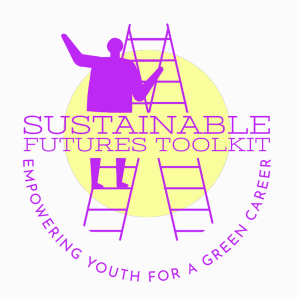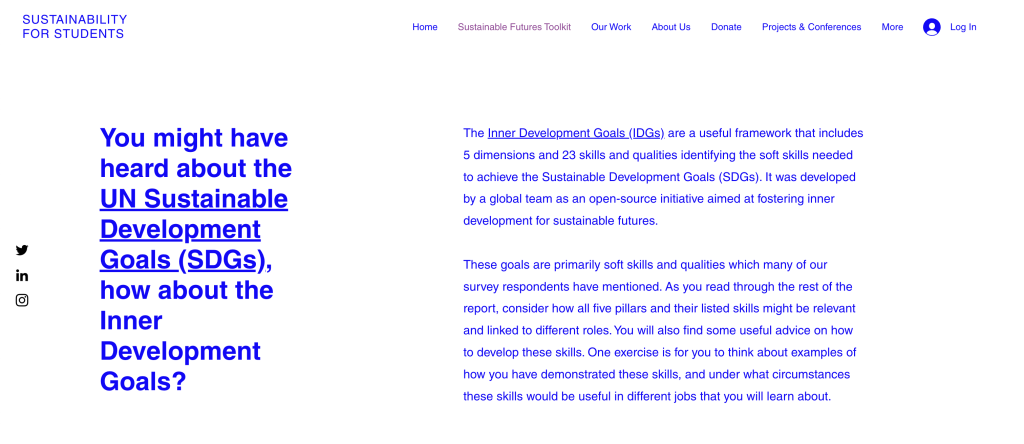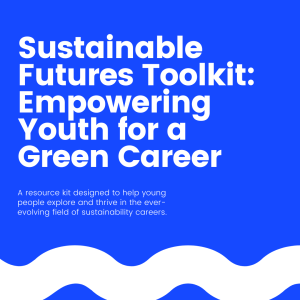Eirini Sampson, a PhD student at the Centre for Environmental Policy, co-founded the Sustainability Future Toolkit – an online resource that helps future-proof the careers of students looking to be part of the critical green transition. From helping students develop ‘green skills’ to learning about how to enter specific industries, she explains how her toolkit prepares students for a sustainable job market.

The world is facing critical environmental and social challenges, with climate change, ecosystem collapse, and conflict ranking amongst the top global risks. As nations strive to meet net-zero targets by 2050 under the Paris Agreement, it is vital to empower young people in this transition. However, despite their growing role in climate action, current education systems do not always equip youth with the necessary skills for a career in sustainability.
According to LinkedIn’s own Green Skills report, globally, 1 in 8 workers has one or more ‘green skills.’ Green skills are skills in resource efficiency, waste reduction, sustainable innovation, carbon accounting, stakeholder engagement as well as basic literacy about climate change and climate policy. The report estimates that the UK is facing a skills gap of 200,000 workers in the energy sector alone.
I am now going into the second year of my PhD at the Centre for Environmental Policy where I research the creation of a just heat transition framework informed by stakeholder interests. While I am passionate about energy policy at the UK and European levels, I am also a passionate advocate for youth inclusion in decision-making.
That is why I created Sustainability for Students, a resource hub aiming to make sustainability discourse accessible to all while amplifying the voices of youth.
In collaboration with a fellow Imperial alumna, Belinda Ng (Class of 2022, MSc Environmental Technology), we came together in June 2023 to brainstorm ways that we could support young people who are feeling unsure about what sustainability-related career options are available to them after graduation and how they could prepare for these careers.
Belinda is the Founder and Executive Producer of SustainaPod, a youth-led podcast that engages youth in direct dialogue with leading sustainability change-makers to explore a range of sustainability topics. Sade Bamimore – a sustainability professional based in New York City – joined our team shortly afterwards, bringing key insights from her book Reimagining Systems for a Sustainable Future.
As young professionals, we all felt there was no single, comprehensive resource that provided students with an overview of the wide range of careers in sustainability and the skills needed for each. We often joke that the Sustainable Futures Toolkit is exactly what we wish we had when we first started in this field. Personally, after graduating from law school in 2021, I found the sustainability sector overwhelming and difficult to navigate, as there were few resources out there discussing the vast amounts of career options in the field.

I could never have imagined becoming an interdisciplinary researcher at one of the world’s top universities. With the complexity of net-zero pathways, choosing a career at 20 felt intimidating, and I wasn’t alone – many young people in my network felt the same way.
While learning is an ongoing process, the toolkit brings together some of the most valuable career lessons we’ve learned along the way. It’s open and accessible to help other young people begin exploring this same journey – hopefully making their path a little clearer than ours was.
Recognising this evolving professional landscape, we created the Sustainable Futures Toolkit to bridge the divide. This resource offers insights and guidance to help young people navigate career opportunities in sustainability, ensuring they have the skills needed to drive meaningful change. We wanted to provide a toolkit that would cater to young people at the early ‘exploratory’ stages of figuring out what they wanted to do for their career, as well as those who were ready to look for jobs in specific sectors.
As the demand for green jobs and sustainability-focused careers continues to grow, the toolkit is meant to act as a comprehensive and freely accessible guide for aspiring sustainability professionals, featuring key skills, practical advice, and career showcases from industry leaders. That is why we have four key features:
- Green Skills Development: A detailed overview of essential skills for a sustainable career, such as systems thinking, stakeholder engagement, and technical expertise in areas like renewable energy and sustainable agriculture.
- Career Showcases: Real-life examples of professionals working in various sustainability sectors, providing inspiration and insight into potential career paths.
- Practical Resources: Access to up-to-date resources that help build the necessary competencies for a sustainability-focused career using our Resource Hub.
- Global Insights: Perspectives and advice from sustainability practitioners around the world, offering a diverse range of experiences and strategies for entering the field.
- Actionable Steps: Clear guidance on how to get started in sustainability, from education and skill-building to networking and job hunting through our Reality Checks.

This is not just an informative report, but it is an action-focused toolkit. Whether you are an undergraduate with an interest in sustainability hoping to learn more about what kinds of jobs are available to you after graduation, or someone hoping to change careers into a more sustainability-focused role, we hope our resource can serve as a springboard for undergraduate and postgraduate students to discover how they want to start their career with a focus on sustainability and impact.
We have gathered insights from nearly 100 sustainability professionals across 16 countries, providing a comprehensive overview of the diversity of jobs in sustainability. Notably, given the sample size of this survey, it is impossible to encapsulate the full spectrum of career experiences across industries and sectors, as even one role could differ from one year to the next. Therefore, the case studies are designed to give you a brief snapshot in time of a particular person’s experience, but by no means represent an entire industry or a standard experience in the field.
With the Sustainable Futures Toolkit, we invite students to take the first step toward a fulfilling career in sustainability. The platform encourages users to explore the toolkit, develop the necessary skills, and draw inspiration from the career showcases to find their own path in the green economy.

For more information, visit the Sustainable Futures Toolkit on the Sustainability for Students website here.
We hope this is the start of what is an exciting journey of self-discovery!
For any feedback or thoughts on how we can improve this, please don’t hesitate to reach out to hello@sustainabilityforstudents.com. If you want to share this with your network, please feel free to use our guidance which can be accessed using our Socials Pack here.